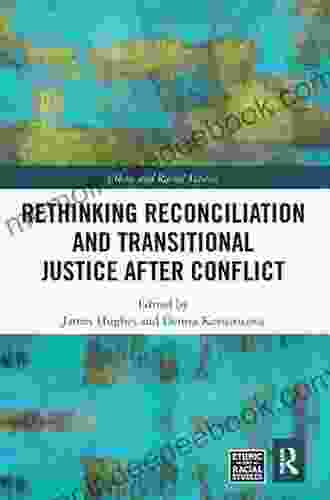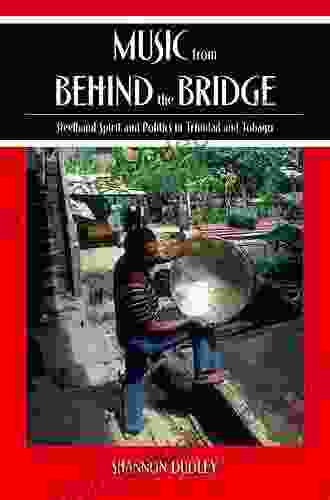Rethinking Reconciliation and Transitional Justice After Conflict: Ethnic and Post-Conflict Reconciliation

The aftermath of conflict often presents a daunting task of rebuilding societies and fostering reconciliation among communities that have been torn apart by violence and division. The process of reconciliation and transitional justice in post-conflict contexts is complex and multifaceted, particularly when it involves ethnic conflict. This article explores the challenges and opportunities in fostering reconciliation and achieving lasting peace in such societies. It examines the role of historical truth, accountability, reparations, and victim-centered approaches in the pursuit of reconciliation.
4.8 out of 5
| Language | : | English |
| File size | : | 2488 KB |
| Text-to-Speech | : | Enabled |
| Screen Reader | : | Supported |
| Enhanced typesetting | : | Enabled |
| Word Wise | : | Enabled |
| Print length | : | 177 pages |
| X-Ray for textbooks | : | Enabled |
The Challenges of Post-Conflict Reconciliation
Post-conflict reconciliation faces numerous challenges, including:
- Deep-seated Grievances and Trauma: Conflict often leaves behind deep wounds and grievances that can hinder reconciliation efforts. Victims may harbor anger, resentment, and a sense of injustice, making it difficult to forgive and move forward.
- Historical Distortions and Misinformation: Conflict can lead to the spread of historical distortions and misinformation, which can further deepen divisions and hinder reconciliation. Addressing these distortions and promoting a shared understanding of the past is crucial.
- Structural Inequalities and Social Exclusion: Post-conflict societies often grapple with structural inequalities and social exclusion that perpetuate divisions and hinder reconciliation. Addressing these inequalities is essential for building a more just and equitable society.
- External Influences and Power Dynamics: External factors, such as political interference or the presence of armed groups, can complicate reconciliation efforts and undermine the legitimacy of transitional justice processes.
The Role of Reconciliation in Post-Conflict Societies
Despite these challenges, reconciliation is essential for post-conflict societies to heal and rebuild. It involves:
- Restoring Relationships: Reconciliation aims to rebuild broken relationships between individuals, communities, and groups that have been affected by conflict.
- Promoting Empathy and Understanding: Reconciliation fosters empathy and understanding among former adversaries, allowing them to recognize the humanity of each other and acknowledge the suffering they have endured.
- Addressing Root Causes: Reconciliation seeks to address the root causes of conflict, such as historical grievances, social inequalities, and political oppression, to prevent future violence.
- Building a Shared Future: Reconciliation creates a foundation for building a shared future based on respect, dialogue, and cooperation.
Transitional Justice and Reconciliation
Transitional justice plays a crucial role in supporting reconciliation by addressing past human rights violations and promoting accountability. Key elements of transitional justice include:
- Historical Truth: Establishing an accurate historical record of past atrocities and human rights violations is essential for reconciliation. This can be achieved through truth commissions or other mechanisms that document the truth and promote public awareness.
- Accountability: Holding perpetrators of human rights violations accountable through criminal trials or other mechanisms is important for preventing impunity and promoting justice. It also provides victims with a sense of closure and acknowledgment of their suffering.
- Reparations: Providing reparations to victims of conflict is an important step towards addressing the harm they have suffered. Reparations can include financial compensation, access to healthcare, education, or other forms of support.
- Victim-Centered Approaches: Placing victims at the center of reconciliation and transitional justice processes is crucial. This involves ensuring their participation, respecting their dignity, and responding to their needs and concerns.
Challenges and Opportunities in Ethnic Reconciliation
Ethnic conflict presents unique challenges for reconciliation due to its deep-rooted historical, cultural, and political dimensions. However, it also offers opportunities for reconciliation.
Challenges:
- Historical Narratives: Reconciling conflicting historical narratives and addressing the grievances of different ethnic groups is a complex task that can be further complicated by political manipulation and the spread of misinformation.
- Collective Identities: Ethnic conflict often involves strong collective identities that can make it difficult for individuals to transcend their group affiliations and recognize the humanity of others.
- External Support: External actors can sometimes exacerbate ethnic divisions by providing support to particular groups or fueling conflicts.
Opportunities:
- Inter-Ethnic Dialogue: Creating spaces for inter-ethnic dialogue and interaction can help build understanding and reduce prejudice.
- Education and Reconciliation: Educational programs that promote tolerance, respect, and understanding of different cultures can play a vital role in fostering reconciliation.
- Civil Society Engagement: Civil society organizations can play a crucial role in promoting reconciliation by building bridges between communities and advocating for justice and equality.
- International Support: International actors can provide support for reconciliation efforts by promoting dialogue, supporting transitional justice processes, and addressing the root causes of conflict.
Reconciliation and transitional justice are complex and challenging endeavors, but they are essential for post-conflict societies to heal and rebuild. By addressing historical truth, promoting accountability, providing reparations, and placing victims at the center of the process, societies can create a foundation for lasting peace and reconciliation. In the context of ethnic conflict, it is important to recognize the unique challenges and opportunities involved and to tailor reconciliation efforts accordingly. By fostering inter-ethnic dialogue, promoting education and reconciliation, and engaging civil society and international actors, societies can strive to overcome the divisions of the past and build a more just and equitable future.
4.8 out of 5
| Language | : | English |
| File size | : | 2488 KB |
| Text-to-Speech | : | Enabled |
| Screen Reader | : | Supported |
| Enhanced typesetting | : | Enabled |
| Word Wise | : | Enabled |
| Print length | : | 177 pages |
| X-Ray for textbooks | : | Enabled |
Do you want to contribute by writing guest posts on this blog?
Please contact us and send us a resume of previous articles that you have written.
 Book
Book Novel
Novel Page
Page Chapter
Chapter Story
Story Genre
Genre Reader
Reader E-book
E-book Magazine
Magazine Sentence
Sentence Shelf
Shelf Foreword
Foreword Tome
Tome Narrative
Narrative Biography
Biography Autobiography
Autobiography Encyclopedia
Encyclopedia Dictionary
Dictionary Thesaurus
Thesaurus Narrator
Narrator Librarian
Librarian Catalog
Catalog Card Catalog
Card Catalog Stacks
Stacks Archives
Archives Periodicals
Periodicals Study
Study Research
Research Lending
Lending Academic
Academic Reading Room
Reading Room Rare Books
Rare Books Interlibrary
Interlibrary Literacy
Literacy Thesis
Thesis Dissertation
Dissertation Storytelling
Storytelling Awards
Awards Book Club
Book Club Textbooks
Textbooks M Eigh
M Eigh David Philip Mullins
David Philip Mullins Howard Mandel
Howard Mandel C P Biggam
C P Biggam Javed Ahmad
Javed Ahmad Alfie Boe
Alfie Boe Simone St James
Simone St James Matthew P Coleman
Matthew P Coleman Shannon Dudley
Shannon Dudley Marcy Pusey
Marcy Pusey L M Bogad
L M Bogad John E Finn
John E Finn David J Melling
David J Melling Patrick Brislan
Patrick Brislan Valerie Hansen
Valerie Hansen Charles Reginald Haines
Charles Reginald Haines Alfred Mann
Alfred Mann Meri Henriques Vahl
Meri Henriques Vahl Culture Kid Books
Culture Kid Books Kate Pearce
Kate Pearce
Light bulbAdvertise smarter! Our strategic ad space ensures maximum exposure. Reserve your spot today!

 Dominic SimmonsHow Energy Security Made Our Nation Great and Climate Security Will Save Us
Dominic SimmonsHow Energy Security Made Our Nation Great and Climate Security Will Save Us Fabian MitchellFollow ·6.6k
Fabian MitchellFollow ·6.6k Emanuel BellFollow ·4.6k
Emanuel BellFollow ·4.6k Emmett MitchellFollow ·11.8k
Emmett MitchellFollow ·11.8k Chance FosterFollow ·11k
Chance FosterFollow ·11k Cole PowellFollow ·16k
Cole PowellFollow ·16k Gus HayesFollow ·7.8k
Gus HayesFollow ·7.8k Cruz SimmonsFollow ·6.1k
Cruz SimmonsFollow ·6.1k Branden SimmonsFollow ·13.8k
Branden SimmonsFollow ·13.8k

 Vernon Blair
Vernon BlairHow to Get a Woman to Pay for You: A Comprehensive Guide...
In the modern dating...

 Levi Powell
Levi PowellPrinciples and Theory for Data Mining and Machine...
Data mining and machine learning are two...

 Andrew Bell
Andrew BellMirrors For The Mind: Milestones In Discovery And...
Mirrors have been a part of human history...

 Alec Hayes
Alec HayesDelving into Natural Language Processing with Java and...
Natural Language Processing (NLP) is an...
4.8 out of 5
| Language | : | English |
| File size | : | 2488 KB |
| Text-to-Speech | : | Enabled |
| Screen Reader | : | Supported |
| Enhanced typesetting | : | Enabled |
| Word Wise | : | Enabled |
| Print length | : | 177 pages |
| X-Ray for textbooks | : | Enabled |














